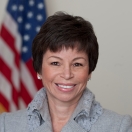
Today, I joined Secretary of Veterans Affairs Eric Shinseki, Chief of Staff Denis McDonough, and Director of the Domestic Council Cecilia Munoz for our Veterans and Military Family Mental Health Conference.
Mental health professionals, members of Veterans Service Organizations, Military Service Organizations, military family organizations, and representatives from the Department of Defense and Veterans Affairs came together to discuss how we can better serve our veterans and military in regards to mental health.
The facts are sobering: Every day, we lose 22 veterans to suicide. Twenty two.
As long as that number is more than zero, we will do everything we can to support our troops, and our veterans who are suffering from a traumatic brain disorder, traumatic brain injury, Post-Traumatic Stress Disorder, or any other affliction.
In homes and bases across the country, these men and women, who have so nobly served our country, may have felt that they were alone. And they leave behind grieving husbands, wives, children, and often parents, who wonder what else could have been done to prevent such a tragedy.
President Obama knows we can do more for these hurting individuals—that’s why he has made mental health for veterans one of his top priorities.
That’s also why we’ve poured resources into high-quality care, and better treatment for our troops.
Just last month, we held the National Conference on Mental Health here at the White House.
As the President said, the conference wasn’t about starting a conversation. It’s about action. Because too many people have been suffering for too long. Too many have been struggling in silence when they need help. And too many have been living in fear of stigmatization or embarrassment. So now isn’t the time for just talk. Now is the time for action. That’s why President Obama announced a number of commitments to move us forward.
For example, we launched the new mentalhealth.gov website. We wanted to make it as easy as possible to access important resources, so we launched a new website aimed at those who suffer from mental illness. It also features success stories from those who've received treatment. I encourage everyone to visit the site to learn more about how to recover, and help others recover.
Because working within the community is so important, the Department of Veterans Affairs will direct 152 of its health care centers across the country to conduct Mental Health Summits with community partners, including local government officials, community-based organizations, and Veteran Service Organizations starting this month.
And we’ve hired thousands more mental health professionals since last year to improve access to mental health services, in addition to continuing our VA Veterans Crisis Line.
To illustrate what’s at stake, I told a story from this line.
A veteran was at home, preparing to end his life. His daughters were sleeping upstairs, and his wife was working. No one was there to stop him. But for some reason, he decided to call the hotline. A staffer picked up, and they talked for awhile. At first, the veteran said things like, “my daughters won’t miss me.” But after talking to the crisis line worker, he realized how important he was to his family, and how necessary it was for his children to have a dad. By the end of the call, he had accepted a referral to see a counselor, and had made a plan to get help. He ended the call by saying, “I want to walk my girls down the aisle.”
This is just one of the countless veterans who have been given a new lease on life. They need to know, as President Obama said last month, that they’re surrounded by people who care about them, and who will support them on the journey to get well. As the President said simply, “We’re here for you.”
Together, we can—and must—help our veterans remember that they are never alone.


